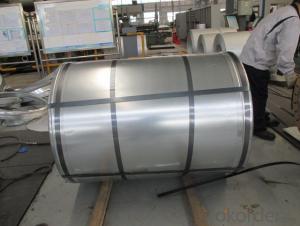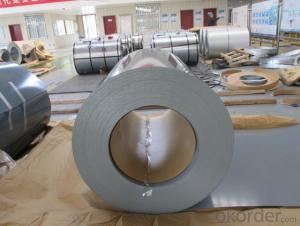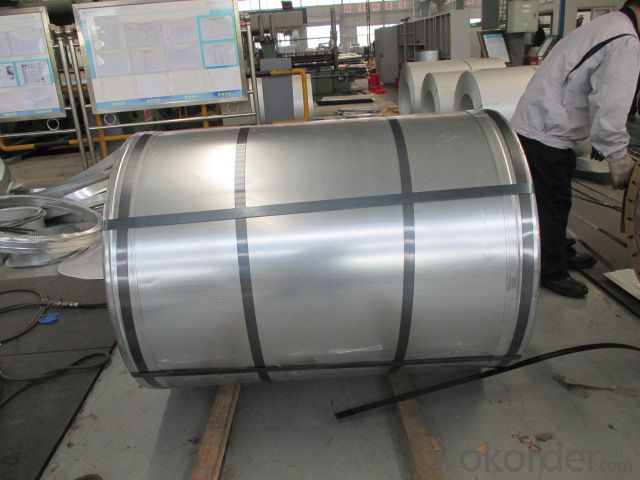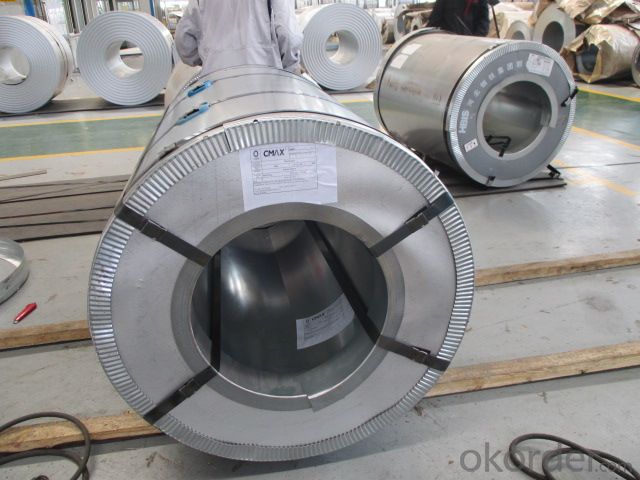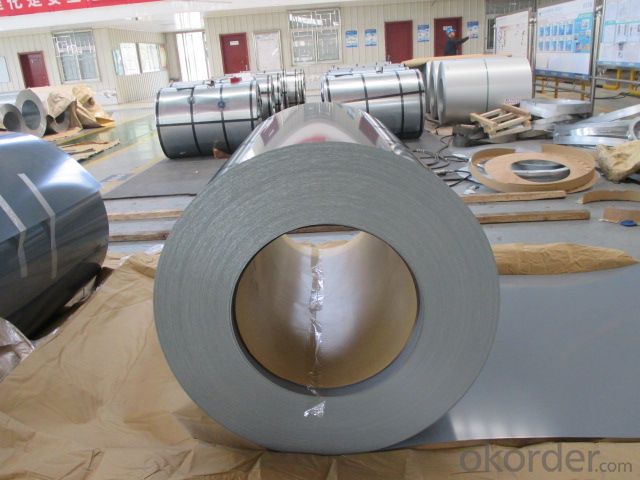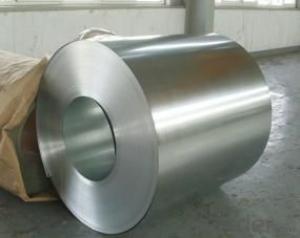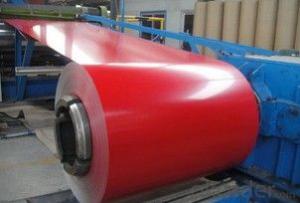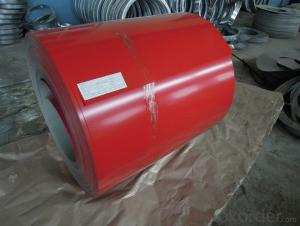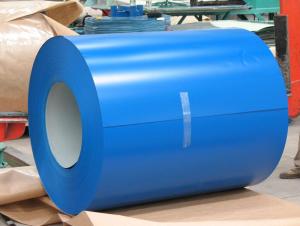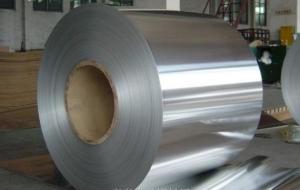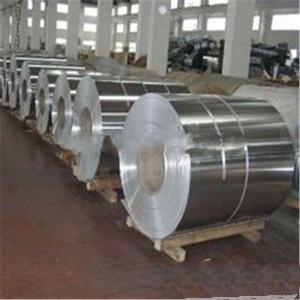Prime Galvanized steel coil
- Loading Port:
- China Main Port
- Payment Terms:
- TT OR LC
- Min Order Qty:
- -
- Supply Capability:
- -
OKorder Service Pledge
OKorder Financial Service
You Might Also Like
Galvanized steel coil
Packaging & Delivery
Packaging Detail: seaworthy export package
Delivery Detail: on request
Specifications
1. more than 10 years’ experience on this field
2. advanced equipments
3. competitive price
4. soonest delivery
Product Description :
Prime Galvanized steel coil
Packaging & Delivery
Packaging Detail: seaworthy export package
Delivery Detail: on request
Specifications
1. more than 10 years’ experience on this field
2. advanced equipments
3. competitive price
4. soonest delivery
Product Description :
Commodity
Hot dip galvanized steel coil
Technical Standard:JIS 3302 / ASTM A653 / EN10143/ GB/T 2518
Grade:DX51D/ S250,280,320GD,SGCC,SGHC,SGH340,SGH400,SGH440,G450,G550
Types:Commercial / Drawing / Deep Drawing / Structural quality
Width: 900mm/1000mm/1219mm/1200mm/1220mm/1250mm
Thickness: 0.2mm~4.0mm
Type of coating: galvanized
Zinc coating: Z40-275g/m2,Z40-Z450g/m2
Surface treatment:zero spangle / regular spangle/ big spangle
ID coil: 508mm or 610mm
Coil weight: 3-10/MT per coil
Package:Properly packed for ocean freight exportation in 20''container
Application::home appliances, constructions, building, machineries
Our Advantages :
1. Expertise:
More than 10 years of manufacture: we know how to properly handle every step of production.
2. Competitive price:
We can offer competitive prices to our customers.
3. Accuracy:
We have excellent technicians and leaders, which can ensure our products are exactly what you want.
4. Materials:
All galvanized steel coils are made of high-quality raw materials.
5. Certificate:
Our products are certified by ISO9001.
6. Productivity:
We have large-scales of production lines,, which can guarantee all your orders will be finished in earliest time.
Hr CGL Technical Process:
Coil loading-> uncoiling-> cutting-> welding-> entry accumulator-> Heating and deoxidization-> galvanizing-> air cooling->water quenching-> air dryer-> tension leveler-> Passivation->air dryer->exit accumulator-> oiling-> cutting-> recoiling->coil unloading-> packing
The furnace heating style: improved Sendzimir heating technology
Hourly output: max.76.3t/h
Process after coating: tension leveling, Passivation or oiling
Our Service
Our quality
Test Equipments of Prepainted Galvanized Steel Coil : Salt-spray tester; Atomic absorption spectrophotometer; Rockwell typer hardness tester; Tensile test machine; Metrohm titration; Laboratory Bend test machine.
Our packing
Properly packed for ocean freight exportation in 20''container, galvanized metal fluted rings on inner and outer edges, galvanized metal & waterproof paper wall protection disk, galvanized metal & waterproof paper around circumference.
R&D department
R&D department concentrates on researching and developing reliable products with best quality. The quality department test and control every process of production to guarantee the best quality of product- Q: Should I stick with the all steel kit over the acrylic tapers and steel plugs? or would the acrylic be ok? I keep hearing that steel is the best and acrylic can cause problems. I just want to do it correctly and take my time with it, no rushing.thanks
- I haven't heard anyone complain about using acrylic so I don't see why it would be a problem. Either would be fine. I prefer acrylic myself but it really doesn't matter.
- Q: What are the quality control measures for steel coil production?
- Quality control measures for steel coil production are essential to ensure that the final product meets the required standards and specifications. Here are some key quality control measures commonly employed in the steel coil production process: 1. Raw Material Inspection: Before production starts, the raw materials such as steel billets are thoroughly inspected for their chemical composition, mechanical properties, and surface defects. This ensures that only high-quality materials are used in the production process. 2. Process Control: Throughout the production process, various process control measures are implemented to monitor and control critical parameters. These may include temperature control, rolling speed, tension control, and lubrication. Regular checks and adjustments are made to ensure that these parameters are within the specified tolerances. 3. Dimensional and Surface Inspection: Steel coils undergo rigorous dimensional and surface inspections to ensure that they meet the required thickness, width, and length specifications. Surface defects such as scratches, pits, or dents are also carefully examined and minimized to meet quality standards. 4. Mechanical Testing: Mechanical properties such as tensile strength, yield strength, elongation, and hardness are tested on a regular basis. These tests are crucial to ensure that the steel coils possess the desired strength and performance characteristics. 5. Visual Inspection: Visual inspection is an important quality control measure to identify any visible defects or irregularities in the steel coils. Trained inspectors check for issues like cracks, corrosion, or uneven surfaces, and take necessary actions to rectify or reject the faulty coils. 6. Non-Destructive Testing: Non-destructive testing methods like ultrasonic testing, magnetic particle testing, or eddy current testing are often employed to detect internal defects such as voids, inclusions, or discontinuities that may impact the quality of the steel coils. 7. Documentation and Traceability: Proper documentation and traceability of all quality control measures are maintained throughout the production process. This includes recording test results, inspection reports, and other relevant data to ensure transparency and accountability. 8. Continuous Improvement: Quality control measures in steel coil production are not static but subject to continuous improvement. Regular audits, feedback from customers, and analysis of process data are used to identify areas for improvement and implement corrective actions to enhance product quality. By implementing these quality control measures, steel coil manufacturers can ensure that the final product meets the required specifications, performs reliably, and achieves customer satisfaction.
- Q: i know stainless steel swords are decoration, what metal is ok for a sword that is usable
- carbon steel will hold a good edge, but will corrode easily. The nicest blades I have seen are made from damascus steel (repeatedly folded over and over). It makes a blade which is good and flexible sideways, but more rigid in the cutting direction, and it holds an edge extremely well. It also looks awesome due to the grain effect from the folds, but is very expensive.
- Q: What are the common quality issues with steel coils?
- Some common quality issues with steel coils include: 1. Surface defects: Steel coils may have surface defects such as scratches, pits, or rust spots. These defects can affect the appearance and smoothness of the final product and may also impact its performance. 2. Dimensional variations: Steel coils may exhibit dimensional variations, such as thickness variations, width variations, or length variations. These variations can lead to difficulties in processing the steel and may result in inconsistent product dimensions. 3. Mechanical properties: Steel coils may have variations in mechanical properties such as yield strength, tensile strength, or hardness. These variations can affect the strength and durability of the final product and may also impact its suitability for specific applications. 4. Coating issues: Steel coils that are coated or galvanized may experience issues with the coating, such as uneven coverage, peeling, or adhesion problems. These coating issues can result in reduced corrosion resistance and compromised aesthetics. 5. Internal defects: Steel coils may have internal defects such as inclusions, voids, or segregations. These defects can weaken the steel and may lead to failure or breakage during processing or use. 6. Edge issues: Steel coils may have edge defects, such as burrs, cracks, or uneven edges. These edge issues can affect the handling and processing of the steel and may also lead to problems during fabrication or assembly. 7. Coil set or camber: Steel coils may exhibit coil set or camber, which refers to the curvature or bowing of the coil. This can result in difficulties during processing and may lead to distorted or misaligned products. To ensure the quality of steel coils, manufacturers employ various quality control measures such as rigorous inspection, testing, and adherence to industry standards and specifications.
- Q: What are the different types of steel coil cutting machines?
- In the market, there is a wide range of steel coil cutting machines available, each tailored to meet specific needs and requirements. Some commonly used types include: 1. Slitting Machines: These machines are utilized to cut steel coils into narrower strips. Equipped with multiple circular blades, they are capable of making precise cuts along the length of the coil, enabling the production of narrower coils or strips. 2. Cut-to-Length Machines: Designed to cut steel coils into specific lengths, these machines possess the ability to accurately measure and cut the coil to the desired length, ensuring uniformity and precision. 3. Rotary Shears: Rotary shears are robust cutting machines that can handle thicker and larger steel coils. Utilizing a rotating blade, they are suitable for cutting thicker gauge materials. 4. Multi-Blanking Machines: Intended for cutting steel coils into multiple smaller blanks simultaneously, these machines have the capability to cut the coil into various shapes and sizes. This makes them ideal for producing multiple parts from a single coil. 5. Slit and Cut-to-Length Combination Machines: These machines integrate the functionalities of both slitting and cut-to-length machines, enabling the cutting of narrow strips and lengths in a single process. They offer versatility and efficiency, saving time and increasing productivity. Each type of steel coil cutting machine possesses distinct advantages and is suitable for specific applications. The choice of machine depends on factors such as coil thickness, desired strip width, required length accuracy, and production volume.
- Q: I just got my Daewoo K2 in 5.56 and i know they are tough and reliable but how well will it fair with steel rounds. I know shooting brass is better for any gun but what kind of extra wear and tear would i be looking at with shooting steel. Also what about reloading steel. Is it recomended. I would not even be asking this but steel is far cheaper than brass ammo, and i need to save some money.
- You can't reload steel cases. I don't really know, but you just can't. If a mild steel case is harder than the chamber and bolt of your firearm, you should have got a better firearm.
- Q: How are steel coils used in the production of telecommunications equipment?
- Steel coils are used in the production of telecommunications equipment for various purposes, such as creating structural components, housing enclosures, and mounting brackets. The steel coils are often shaped, cut, and formed into different parts that provide strength, durability, and support to the equipment. Additionally, steel coils may be used in the manufacturing of antennas, transmission towers, and other infrastructure elements that are crucial for telecommunications networks.
- Q: What are the advantages of using steel coils in various industries?
- There are several advantages of using steel coils in various industries. Firstly, steel coils are highly durable and have a high strength-to-weight ratio, making them suitable for heavy-duty applications. Secondly, steel coils offer excellent resistance to corrosion, which is crucial in industries exposed to harsh environments or chemicals. Additionally, steel coils can be easily formed and shaped, allowing for flexibility in design and customization. Lastly, steel coils are recyclable, making them an environmentally-friendly choice while reducing waste and promoting sustainability.
- Q: What are the different types of steel coil edge treatments?
- In the manufacturing and processing of steel coils, various steel coil edge treatments are employed. These treatments serve to improve edge quality, protect against damage, and facilitate the handling and processing of the coils. Some of the prevalent types of steel coil edge treatments are as follows: 1. Mill Edge: The steel mill provides this standard edge treatment, which is the raw edge of the steel coil generated during the hot rolling process. The mill edge is typically sharp and may exhibit some irregularities. 2. Slit Edge: Slit edge treatment involves slitting the coil to the desired width and subsequently processing the edges to eliminate any burrs or unevenness. Compared to mill edge coils, slit edge coils have smoother edges. 3. Deburred Edge: The deburring process removes any sharp or rough edges from the coil using specialized equipment or techniques, resulting in a smoother and safer edge. Deburred edges find common use in applications where safety and handling are of utmost importance. 4. Rounded Edge: Rounded edge treatment entails rounding the edges of the coil to minimize the risk of damage during handling and processing. This treatment is frequently employed in applications where the coil must be uncoiled or fed into machinery without incurring any damage. 5. Beveled Edge: Beveling involves chamfering or cutting the edges of the coil at an angle. Beveled edges are utilized in applications where easy insertion, joining, or welding of the coil is required. The beveling process also enhances the strength and durability of the edge. 6. Sheared Edge: Shearing is a cutting process that employs high-pressure blades or scissors to cut the coil to the desired width. Sheared edge treatment yields a clean and straight edge, devoid of burrs or irregularities. It is commonly employed in applications that necessitate precise dimensions and a smooth edge. These are merely a few examples of the various steel coil edge treatments commonly employed in the industry. The selection of edge treatment depends on specific application requirements, such as handling, processing, safety, and aesthetics.
- Q: I want a stainless steel refrigerator that doesn't leave fingerprints and I'm looking on Lowe's website but they have too many choices and i don't have a clue what they are. The have stainless, stainless look, stainless steel, monochromatic satina, and monochromatic stainless steel. Can anyone tell me what the heck those mean? lol
- RE: stainless steel refrigerator that doesn't leave fingerprints? I want a stainless steel refrigerator that doesn't leave fingerprints and I'm looking on Lowe's website but they have too many choices and i don't have a clue what they are. The have stainless, stainless look, stainless steel, monochromatic satina, and monochromatic stainless steel....
Send your message to us
Prime Galvanized steel coil
- Loading Port:
- China Main Port
- Payment Terms:
- TT OR LC
- Min Order Qty:
- -
- Supply Capability:
- -
OKorder Service Pledge
OKorder Financial Service
Similar products
Hot products
Hot Searches
Related keywords
